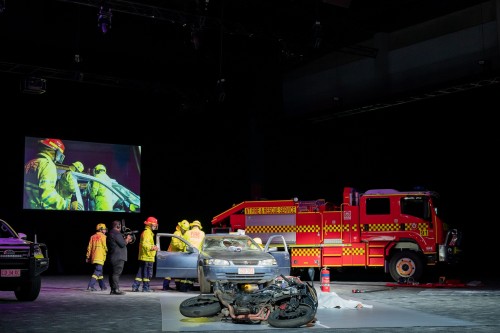
With thousands of Territorians hitting the open road over these holidays, preparing your car and planning ahead could save lives – not just time. While we’re often focused on getting out the door, or keeping the kids entertained for the journey, it’s important we plan for the drive itself.
With 52 deaths on Northern Territory roads in 2022 (higher than the 35 lost in the whole of 2021), it’s essential to take the time to check your vehicle is safe before setting off.
From packing the boot correctly to strapping in pets, taking steps to make sure you arrive safely at your destination, and no one gets hurt on the way, is important.
Lachlan Miller knows the dangers of this all too well. October 2022 marks nine years since Lachlan a former Diesel Mechanic – who now lives in Adelaide – acquired a traumatic brain injury after his vehicle crashed into a bed base that had been flung from the back of a vehicle in rural Darwin.
Lachlan shared his story with over 1200 Northern Territory high school students at the 2022 Street Smart High event, where he was able to highlight the importance of securing loads when travelling on the road.
“A couple of cars in front of mine was a vehicle towing a boat and inside that was a Queen’s size mattress, which was not tied down properly,” Lachlan recalls. “The car in front of me had enough room and managed to get around the mattress when it fell off onto the road,” he says. The unimaginable came next. “I've hit the mattress and my front left wheel popped off and smashed out the left-hand side window.”
Lachlan’s vehicle then flipped and crashed into a nearby house, and he was ejected from the vehicle. “I was placed in a medically induced coma, and because I had no blood supply to my brain for so long, it was starving of oxygen and a lot of damage was done. “I also had a broken back and hip. My C4 and C5 in my neck were shattered to a million pieces.”
It has been a long road to recovery ever since. “I’d press a buzzer in the morning and wait for someone with a harness to lift me out of bed and put me in an electric wheelchair and drive me to breakfast.” Today, Lachlan lives with short-term memory loss. “I suppose it’s the little things, like I'd put the washing on and forget about it, and then all of a sudden, I'll come back to it a few days later and have smelly washing,” Lachlan laughs.
“So, I’ve set up a strategy for myself to make sure I put my dirty clothes basket in the middle of the house somewhere so I can see it. ”To avoid other road users experiencing what he has, Lachlan’s advice is simple. “Don’t be afraid to pull over and check your load again,” he says. “I also may have been a little bit close to the car in front of me, so give yourself a bit more room to move.”
Tips to securing your load
- Whether they’re stored in the boot, trailer or caravan, heavy items such as eskies or large suitcases should be placed in a secure position, low to the ground. This way, they won’t slide around when turning and affect the stability of your vehicle. These items should be placed level with the rear seats or behind a cargo barrier to make sure they don’t fly through the cabin during a crash.
- Even ordinary items like laptops, handbags and water bottles can turn into dangerous projectiles when you suddenly slam on the brakes.
- While it’s tempting to pack your car to the rafters, you should ensure you always have a clear view out the rear of your vehicle.
- If you choose to strap luggage onto your car, only use roof racks which are approved by your manufacturer.
- You should also avoid placing heavy items on the roof as they can disrupt your car’s centre of gravity, which can affect the way it handles.
- If you are loading a trailer, make sure the load is positioned correctly and use suitable restraint equipment that is in good condition and remember to check your load restraints before leaving and during the trip.
Register your school or find out more about Street Smart High 2024, an opportunity for students to learn how to avoid situations that place themselves and others in danger. AANT thanks our funding partners for their ongoing support.

